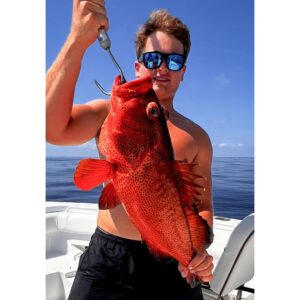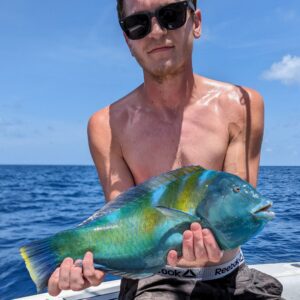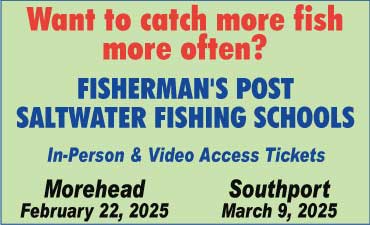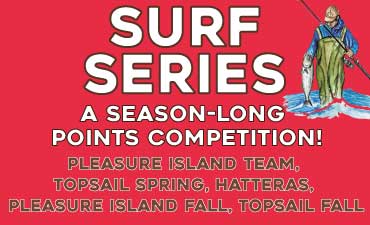Releases: October 2023
The N.C. Division of Marine Fisheries recently certified a new state record Red Hind (Epinephelus guttatus). Christopher Rocci, of Morehead City, caught the 10-pound, 2.4-ounce fish 45 miles offshore of Beaufort Inlet on July 27. The previous state record Red Hind weighed 9-pounds, 12.1-ounces, and was caught off Wrightsville Beach in 2023. Rocci’s fish measured 25.5-inches total length (from the tip of the snout to the tip of the compressed tail) and had a 20.25-inch girth. The fish was landed using a Penn Ally II rod with an Okuma SLX-50WII reel with squid and pinfish on 80-pound braid.
For more information on state record fish, go to the division’s State Saltwater Records webpage or contact the North Carolina Saltwater Fishing Tournament staff at saltwater.citations@ncdenr.gov.
The North Carolina Division of Marine Fisheries will implement adaptive management with a harvest moratorium in the Albemarle Sound Management Area. Despite recent management actions taken by the N.C. Marine Fisheries Commission (MFC) and the N.C. Wildlife Resources Commission (WRC), the Albemarle/Roanoke striped bass stock continues to be overfished and to experience overfishing.
Division of Marine Fisheries Director Kathy Rawls told the Marine Fisheries Commission there will not be a fall 2023 striped bass season in the Albemarle Sound Management Area and that she anticipates the need to implement a harvest moratorium for 2024. Her statements came following a presentation by Division staff on adaptive management measures under Amendment 2 of the Estuarine Striped Bass FMP and the updated stock assessment at the Commission meeting last week.
A 2020 stock assessment indicated the Albemarle/Roanoke striped bass stock is overfished and overfishing is occurring, and the Division and Wildlife Resources Commission implemented reduced possession limits in January 2021 to end overfishing. But a 2023 peer-reviewed stock assessment update indicates that abundance has not improved. In fact, Division data shows the Albemarle/Roanoke stock has had six consecutive years of spawning failures.
The total allowable landings of 8,049 pounds, as determined by the recent stock assessment update for the entire Albemarle/Roanoke system, is, effectively, too low to manage, so a moratorium is needed. Stocking resumed in the Albemarle Sound in 2023 to supplement multiple consecutive years (2017-2022) of very low recruitment and will continue in the Albemarle Sound for at least the next three years.
The N.C. Marine Fisheries Commission is looking for commercial and recreational fishermen, scientists, and other interested parties to sit on various fisheries advisory committees.
Two regional advisory committees – Northern and Southern – and three standing advisory committees – Finfish, Habitat and Water Quality, and Shellfish/Crustacean – review matters referred to them by the commission, such as draft Fishery Management Plans and Coastal Habitat Protection Plans. Committees may also bring fisheries issues pertaining to their region or subject matter to the commission’s attention.
The Marine Fisheries Commission chairman appoints members to these committees for three-year terms, and several terms will expire in January.
To qualify to serve on a committee, applicants must not have had a significant fisheries violation within the past three years.
Individuals interested in serving as an adviser should be willing to attend meetings at least once every two months and actively participate in the committee process, which includes reviewing scientific documents and issue papers to make recommendations on management strategies.
Advisers who complete the necessary paperwork will be reimbursed for travel and other expenses incurred in relation to their official duties.
To apply to serve as an advisor, please complete the online form located here. Printable applications may also be accessed here or by calling 252-726-7021. All applications must be submitted by Nov. 1, 2023, online, by mail to: N.C. Division of Marine Fisheries, P.O. Box 769, Morehead City, N.C. 28557, Attention: MFC Office, or by email to MFC@deq.nc.gov with the subject line: AC Application.

Christopher Rocci, of Morehead City, with the new state record Red Hind. He caught the 10-pound, 2.4-ounce fish bottom dropping 45 miles offshore out of Beaufort Inlet using cut bait.
Recently, the nation’s leading recreational fishing and marine conservation organizations released a released a white paper on the National Oceanic and Atmospheric Administration’s (NOAA) findings that its Marine Recreational Information Program – Fishing Effort Survey (MRIP-FES) may be overestimating recreational catch and effort data by 30 – 40%.
The Marine Recreational Information Program is a NOAA program that provides estimates of recreational fishing catches and trips that occur from Maine to Mississippi and Hawaii. These data are used to assess and manage state and federal fisheries in the Atlantic, Gulf of Mexico, and Hawaii.
A recent pilot study conducted by NOAA found that MRIP-FES may be overestimating recreational catch and effort data by 30 – 40%. This is the third time in 13 years serious issues have been uncovered in NOAA’s recreational fishery data program.
Many states have demonstrated the capability of developing survey programs to estimate recreational catch and effort data with more precision than MRIP. NOAA needs to work with all states to identify the best steps forward including the opportunity to transition some or all recreational data collection to the states and how to best provide support (i.e., funding) to states that lead data collection improvements.
Some states may not be ready to transition to their own data collection program for estimates of effort. For those states, NOAA must collaborate with states and stakeholders on needed reforms to recreational data collection, many of which were identified in a recent National Academy of Sciences report. At the same time, NOAA must also pursue meaningful investments in the development and implementation of recreational management improvements.
“In 2013, I testified before the U.S. House of Representatives that MRIP was a good general survey but that it would never provide the data accuracy and reliability we need for managing the recreational sector to annual catch limits. MRIP continues to prove my point a decade later,” said Chris Horton, Senior Director, Fisheries Policy for the Congressional Sportsmen’s Foundation. “We are encouraged that the administration at NOAA Fisheries is embracing state data programs as a better path forward, at least in the Gulf. However, each year it becomes more obvious that the increasingly ineffective federal management model of managing to a theoretical annual quota based largely on old catch data is truly the elephant in the room.”
“The recreational fishing community’s confidence in federal fisheries data couldn’t be lower,” said Mike Leonard, vice president of government affairs for the American Sportfishing Association. “Achieving fisheries management that balances conservation and access, and that anglers can trust, requires fundamental changes to how these data are collected. Additionally, recognizing the inherent challenges in gathering recreational catch data at a level of precision needed to meet statutory management requirements, managers need to look to alternative management approaches such as what is being deployed in the Mid-Atlantic for summer flounder, scup and black sea bass.”
“Yet another major revision to the federal recreational data collection system is upon us, and it should bring a realization that NOAA is just not capable of doing this job,” said Ted Venker, conservation director of Coastal Conservation Association. “At best we are looking at several more years of questionable revisions, recalculations, and recalibrations based on a suspect data system that has never proven it can produce accurate information. This is no way to manage a public resource. It would be irresponsible to continue down this road rather than exploring and supporting state-based options to better manage the recreational sector wherever feasible.”
“NOAA has had multiple chances to fix management of recreational fisheries, and it has failed every time. A ready alternative exists in states that have already taken steps to develop better recreational data than the feds have ever had, ” said Jeff Angers, president of the Center for Sportfishing Policy. “It’s time to stop making the same mistakes, stop wasting taxpayer money, and stop causing chaos in recreational fisheries management and coastal communities. It’s time for all parties to work together to properly fund state efforts to manage recreational fisheries.”
The N.C. Division of Marine Fisheries recently certified the first state record Puddingwife Wrasse (Halichoeres radiatus), and the fish may break the world record, as well.
Connor Stone, of Southport, caught the 3-pound, 11-ounce fish while 10 miles off Southport on July 27. Stone plans to apply to the International Game Fish Association for the world record. The current certified world record Puddingwife Wrasse weighs 3-pounds, 8-ounces and was caught off Key West Florida in 2003. Stone’s fish measured 18-inches fork length (from the tip of the nose to the end of the tail) and had a 13-inch girth. Stone landed the fish using a Fiblink Signature rod and a Fin-Nor LTC16h reel with 50-pound braid using squid as bait.






